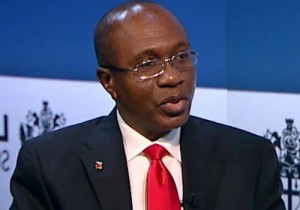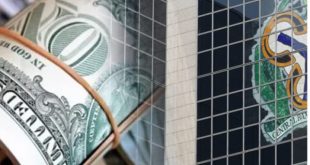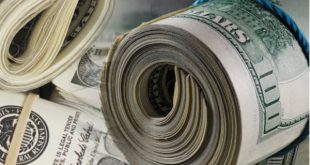
Mr Godwin Emefiele answering questions during his screening by the Senate for Central Bank Governorship in Abuja on Wednesday
Meanwhile, the Financial Derivatives Company has predicted 200 basis points drop in inflation to 7.9 percent for November, from 8.1 percent in October.
In order to achieve its objective of single digit interest rate, the CBN has persistently pursued a tight money supply policy, through aggressive mop up of idle cash (excess liquidity) in the banking system, by selling treasury bills.
Treasury bills (TBs) are short term government debt instruments. They are usually issued by central banks to borrow money on behalf of the government from the public. They are also used to control the amount of money in the economy.

In continuation of its tight money supply policy, the CBN announced that from this week till first week in March of 2015, it would sell N1.22 trillion worth of treasury bills. The TBs come in three variant of 91 days, 182 days and 365 days. This week the CBN intends to sell N248 billion worth of TBs comprising N55.41 billion worth of 91 days TBs, N83.13 worth of 182 days TBs and N110.4 billion worth of 365 days TBs.
In January 2015 the apex bank intends to sell N385 billion worth of TBs comprising N80 billion worth of 91 days TBs, N98 billion worth of 182 days TBs and N205 billion worth of 365 days TBs. In February, the apex bank will sell N77.62 billion worth of 91 days TBs, N60 billion worth of 182 days TBs and N197 billion worth of 365 days TBs, totalling N334 billion worth of TBs to be sold in February. In the first week of March, the CBN will sell N254.95 billion worth of TBs comprising N17.85 billion worth of 91 days TBs, N50 billion worth of 182 days TBs and N187 billion worth of TBs.
Investigation however reveals that the treasury bills are being issued to withdraw cash injection from TBs that would mature within this period. Analysis show that payment for the matured TBs would have resulted into cash injection of N1.22 trillion and hence undermine the decision of the CBN to rid the banking system of idle cash (excess liquidity).
The apex bank at its last Monetary Policy Committee (MPC) meeting had blamed the recent upsurge in foreign exchange demand on the excess liquidity in the banking system. The Committee in its communiqué stated, “Available data indicates that banking system liquidity has been lavishly deployed in pursuit of speculative foreign exchange trading at the short-end of the market.” As a result, it increased the cash reserve requirement (CRR) of banks on private sector deposit to 20 percent from 15 percent, while it increased the Monetary Policy Rate (MPR) to 13 percent from 12 percent.
Defending the decision of the apex bank during an oversight visit by the House Committee on Banking Currency, CBN Deputy Governor, (Corporate Services), Mr. Bayo Adelabu, said, “We believe that the pressure on the naira, apart from the declining oil prices is also as a result of liquidity in the banking industry whereby a lot of frivolous demands for foreign exchange are being made by customers of banks, because the banks are able to extend credits to them. We are saying no.
We want you to lend to the critical and productive sectors of the economy not trading, not to import toothpicks. So we are saying that the only thing we can do to reduce the capacity of the banks to grant loans to these customers for trading is to mop up more of the monies available to the banks, which is why we increased the CRR on private sector deposits to 20 percent from 15 percent, which will amount to about N500 billion withdrawal from the banking industry. We believe it will reduce the pressure on the foreign reserves. If we don’t do that, the impact on the common man is going to be increased cost of production.”
Inflation falls to 7.9% in November
Meanwhile, analysts at Financial Derivative Company (FDC) have predicted 7.9 percent inflation. They however warn that increased political spending ahead of the general election and increased demand for foreign exchange might exert upward pressure on the inflation rate.
According to the FDC Economic Bulletin released on Friday, “FDC’s projection of Nigeria’s headline inflation in November is 7.9 percent year-on-year (y-o-y), a moderation from the level in October of 8.1%. The marginal decline in money supply, slight increase in agricultural and the continuous fall in global commodity prices (index declined by 11.74 percent year-to-date are major factors contributing to the projected decline in the headline inflation”
“If the rate comes in at 7.9 percent, it will be within the CBN target range for 2014. The CBN will not be swayed by this decline considering the impact of the devaluation of the currency on prices. Therefore, the hawkish stance of the CBN is not expected to change.
Furthermore, the rate of change in consumer prices will be within the CBN 6 percent -9 percent band. This is partly due to the contractionary monetary policy and low global commodity prices. “Our November 2014 Lagos urban inflation survey revealed a decline in consumer prices from the previous month’s level. FDC’s Lagos urban inflation declined to 7.66 percent y-o-y compared to the 8.11 percent y-o-y recorded in October.
This is the fifth consecutive month that the Lagos urban index has decreased. The non-food index declined to 8.45 per cent from 9.09 per cent in November while the harvest dependent food index also rose to 6.33 per cent from 6.09 per cent in the previous month as market inventories decline.”
On inflation outlook for December and January, the company said, “The pressure on the naira is expected to be sustained at the interbank market in the near term as foreign investors take out their funds to mitigate possible political risks as the elections draw near. Increased fiscal overdrive and political spending will increase money supply. In addition, the psychological and artificial scarcity of petroleum products at the end of every year is likely to have negative implication on transportation costs. These are major concerns for consumer prices in December 2014 through January 2015.”.
 MMS PLUS NG – Maritime, Aviation, Business, Oil and Gas News Online Newspaper with coverage in Maritime, Oil and Gas, Aviation, Power and Energy as well as Financial News
MMS PLUS NG – Maritime, Aviation, Business, Oil and Gas News Online Newspaper with coverage in Maritime, Oil and Gas, Aviation, Power and Energy as well as Financial News









